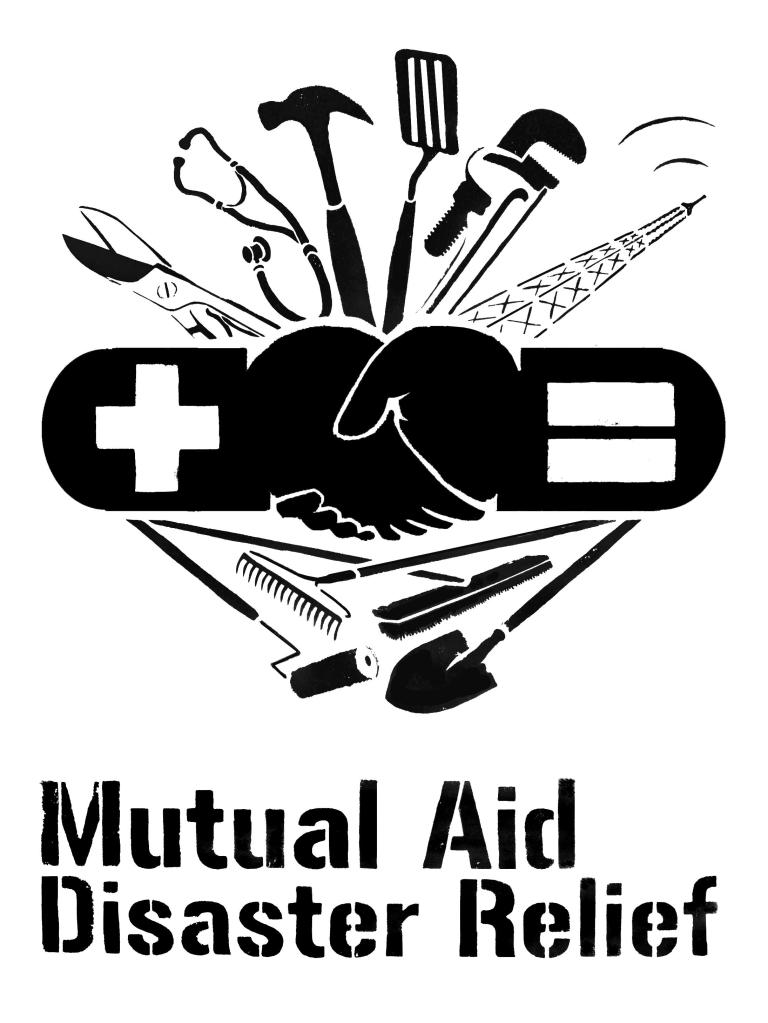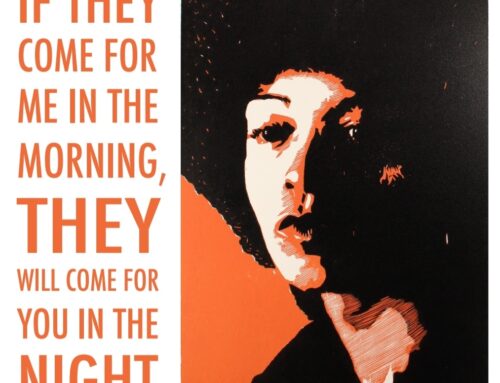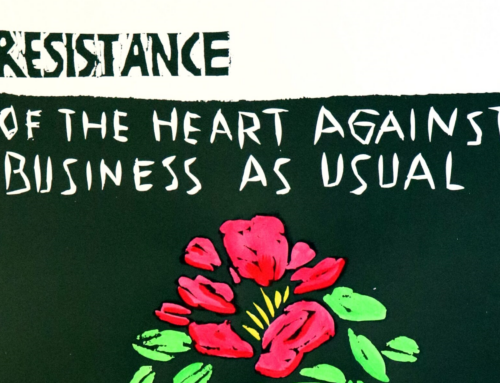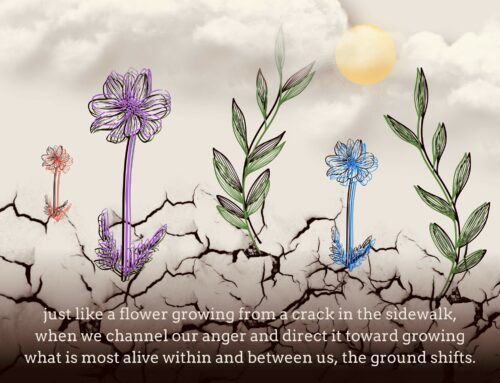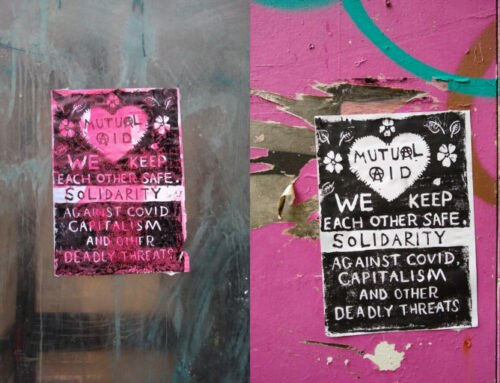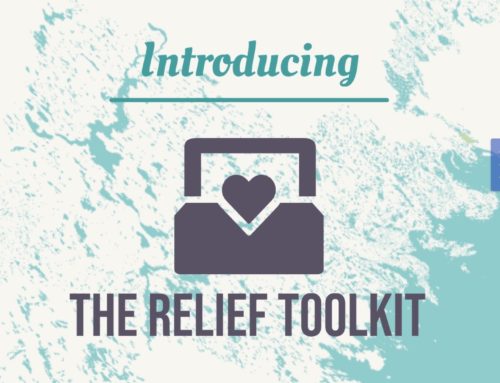Our hearts are breaking to see another (un)natural disaster unfolding in the Gulf. But we know that with people power we can overcome and regenerate, together. And we know that Mutual Aid Disaster Relief is ready to fill the big shoes handed down by its revolutionary prototype – together all of us will certainly play a big role in the recovery of Houston and the region, as we support locals and outsiders already working on the ground, and organize nationally to send additional people and resources to affected areas.
This is a great time to make a donation of money or materials. It is a great time to give your time and energy, especially if you have valuable skills like medicine, construction, cooking, auto repairs, computer and communication tech, legal knowledge, or community organizing.
Please consider a donation to Mutual Aid Disaster Relief. We know how to put it to good use.
You can donate cash to Mutual Aid Disaster Relief here.
You can purchase materials from this Amazon wish list and they will be shipped directly to groups on the ground in Houston.
You can sign up to volunteer by emailing us at [email protected].
Hurricane Harvey’s fury in Texas has dumped historic rainfall, swelling into unprecedented flooding. Over 50 inches of rain have fallen in the Houston area, and many at the scene are describing it as “apocalyptic.”
It is just the latest in a growing chain of unprecedented disasters. The last three summers have each been historic, the hottest on record; extreme weather events, especially droughts and floods, have become common. Though 2017 is slightly cooler than 2016 globally, that did not prevent record setting temperatures in Iran (129º F) and Pakistan (128º F). And South Asia’s monsoon rains have been biblical, killing over 1200 people so far in Pakistan, India, Nepal, and Bangladesh; more than one third of Bangladesh is currently under water.
Howling in my ears like a hurricane wind are the echoes of another historic storm season. In 2005 Hurricane Katrina ruptured the levees of New Orleans and killed more than 1200 throughout the region, and Mumbai was drowned by 37 inches of rain in only 24 hours, killing more than 1000 in the city alone.
When history repeats itself, it is telling us that we have failed to learn our lesson. I am bursting with feelings from that historic 2005 hurricane season, when I feared for old friends in India and wept with new friends in New Orleans – I spent over a year in NOLA, working with the incredible Common Ground Collective. It was a transformative experience for me, I learned much during that time. And now I am hearing many echoes… may we all listen, and learn.
Houston is the nation’s fourth largest city, and its most diverse. And it is extremely vulnerable, with the metro area’s 6.3 million people occupying ten thousand square miles of low-lying coastal clay deposits with paved and poorly-planned sprawl. Catastrophic flooding is becoming the new norm – including Harvey, Houston has been hit by three “500-year flood” events in the last three years.
To make matters exponentially worse, the “Petro Metro” is full of oil infrastructure. The largest oil refinery in the United States is in nearby Port Arthur; the Gulf Coast has half of the refineries in the country. Petrochemical industries not only increase the likelihood of catastrophic storms by contributing to climate change, but they also destroy the coast’s ecologically resilient ability to protect itself by slicing through protective barrier islands, mangroves, and salt marshes with pipelines and shipping corridors. Now an industry that is one of the leading contributors to climate change is being attacked by the angry sea and sky, and its neighbors, mostly poor people of color, are afflicted by the toxins released in the process.
Houston is drowning in many floods.
Not only a flood of rain made worse by increasing temperatures, rising sea levels, and devastated coastlines, all consequences of fossil fuel extraction and burning…
But also a flood of toxic petrochemicals that disproportionately affect communities of color, communities of the poor. In urban and rural locales worldwide, polluting industries are always sited at the intersections of other oppressions, leading to high rates of asthma, heavy metal poisoning, and cancer in marginalized fence-line communities. In the wake of Harvey, an estimated two million pounds of chemical pollutants have been released into the air as at least fifteen refineries have been forced into sudden shutdowns.
No less toxic is a flood of racism, exemplified by SB 4, a bill which bans sanctuary cities in Texas and allows police to demand citizenship papers from anyone they detain, which was slated to go into effect on Friday (but held up in the courts for now), and by the impending repeal of DACA (Deferred Action for Childhood Arrivals), which provides status for over 85,000 Houston residents. Undocumented immigrants are afraid to go to shelters because they are hearing rumors that they will be summarily deported (the mayor and sheriff are doing all they can to counter these rumors and assure people that they are welcome). And outside the city, Border Patrol agents kept their checkpoints open to snatch anyone trying to evacuate. Meanwhile, Trump continues twating about his damned wall.
Across this country we see a newly enraged flood of the poisonous politics of hate, the kind that attack black and brown and queer peoples while celebrating contemptuous racists like Joe Arpaio and murderous brutes like Dave Clarke. And let’s not be too shy to say, that if a consequence of Harvey is the further elevation of the police state, we may witness another historic repetition – that of the rise of fascism (An ideology to which both of these sheriffs are sympathetic. Arpaio once called the immigrant detention facility consisting of tents in the desert “my own concentration camp,” while Clarke railed, “Don’t try to understand the sick ideology of ‘Islamism,’ destroy it.”).
The deluge is exacerbated by a flood of poverty fueled by inequality and neglect, such that “voluntary evacuation” is only available to a fraction of the population who own a car. The Harris County Jail, full of 8,000 people who broke the law and are thereby exempted by the 13th Amendment from their right to be free from enslavement, has not been evacuated. And the media report almost nothing about rural communities, who have less resources; if historical patterns repeat, they will surely receive little attention from bumbling FEMA and disingenuous Red Cross.
All of this is gleefully gambled upon by a flood of disaster capitalism with its extreme disregard for fundamental human rights coupled with legal armaments elevating “corporate rights.” Which, even in peaceful times, takes advantage of every crisis to further exploit, further displace and disinherit, those who are least powerful, while surreptitiously dismantling regulations and taxes upon corporations and the 1%. Which, if it follows the post-Katrina model in the wake of Harvey, will aggressively privatize schools, undermine unions, and rapidly gentrify historic neighborhoods in the wake of the storm while shoveling tax-payer money into the pockets of private contractors . Profiteering promoted by Mike Pence in a memo on “Pro-Free-Market Ideas for Responding to Hurricane Katrina and High Gas” has now become common practice in the “shock doctrine” so well described by Naomi Klein, and it gives clear meaning to Trump’s Corpus Christi claims that “It’s going well,” and “”We’ll congratulate each other when it’s all finished.”
And as if that were not enough, contrary to all good sense, we still do not see an end to the flood of willful ignorance and bad planning, anchored by bought politicians and perpetuated by the mainstream media which seem simply incapable of using the words “climate change,” in spite of clear and present danger and the urgent need to ready ourselves for an even more uncertain future.
But even while I am heart-broken by the seemingly endless stories of loss, even while I am burdened by fears of history repeating – by the post-apocalyptic post-Katrina memories that make my teeth grind, my muscles ache, and my pulse quicken – my fears are comforted by a very intentional kind of repetition. I also have memories of generosity and sharing, of empowerment, of good-old-fashioned cooperative problem-solving. Now I am seeing hundreds of ordinary people using borrowed boats to rescue stranded residents, and truckloads of donated cleaning supplies destined for local environmental and social justice organizations that have metamorphosed into grassroots hurricane relief groups overnight – visions like these make me believe that a better world is possible.
The people themselves are doing what they have always done – taking care of each other.
Local organizations like Bayou Action Street Health, Common Ground Relief Austin, Black Women’s Defense League, Counter Balance, and Houston Food Not Bombs, as well as thousands of ordinary folks independent of any organized effort, are already busy providing much-needed aid, as FEMA is still doddering around setting up their HQ.
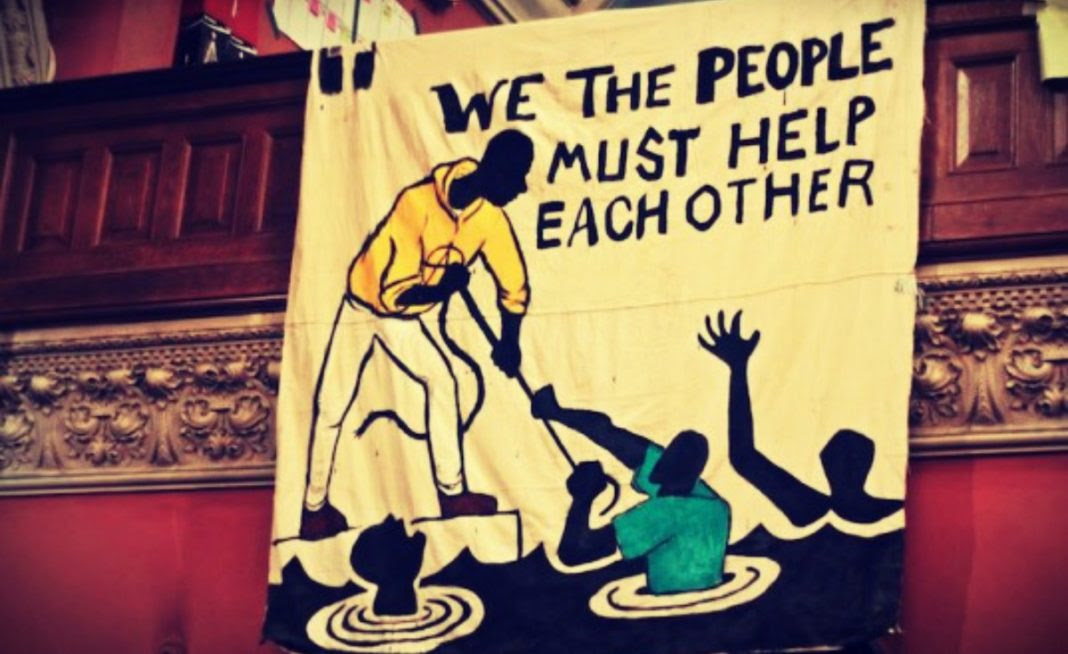
More help is needed, and support from a national network like Mutual Aid Disaster Relief is essential. MADR is breaking down the divide between givers and receivers of aid, extolling the principle of “Solidarity Not Charity.”
Solidarity Not Charity means a radical and holistic approach, one that asks about the root causes of problems and insists that aid-workers listen and understand what is needed, one that empowers survivors to realize their own recovery by any and all means available, and to vision the organization necessary to achieve the power to build those means that are not yet available.
Solidarity Not Charity transcends politics – it recognizes our common human needs and abilities – while also radically dissecting the political nature of, and the political problems implied by, unnatural disasters (those caused and encouraged by disaster capitalism). Our struggles may be diverse, but our pursuits of Freedom, Justice, and Dignity all share a common path, one which we must make by walking together. Charting this path is difficult and sometimes uncomfortable (that is why listening is so important!), but it is the path of hope.
Solidarity Not Charity means recognizing that all of us are learning, teaching, growing, struggling, advancing, and opening our eyes and our hearts through this experience of radical love and compassion.
Although our work may include distributing food and water or rebuilding homes when needed, we engage in many other activities, and our approach is based first in community organizing.
Community organizing is the most powerful form of disaster response, as it does not merely focus on rebuilding infrastructures and economies, but visions the rebuilding of the power of the people. We understand that self-determination is the most fundamental human right. We insist that marginalized communities be centered in recovery and in resistance, because diversity is strength.
Community organizing facilitates future community resiliency and better disaster preparedness. Mutual Aid Disaster Relief is a standing network of local groups which will take advantage of each disaster moment to train new members, initiate new groups, and strengthen the network; continue during peaceful times to strategize, nurture communications, and provide education in disaster preparedness to the public; and then encourage and facilitate existing groups in aiding and training new groups during the next disaster moment. This way, we will be stronger and smarter and bigger and more diverse every time.
Now is the time for inspired action. We will not wait for permission, we will not hand over our resources or ourselves to professionals or experts. We know that we can solve our problems through collaborative direct action.
Direct action from those with privilege can open up space around those with less, can alleviate crushing oppression just long enough for communities to experience their own power, to see what they are truly capable of accomplishing together, and to give them hope.
Direct action from those with less privilege can prove to those who possess more that we are all equals, that we are all strong just as we are all afraid, and that nonviolent action can open eyes, start conversations, and help to bridge perceived divides.
Direct action from the grassroots is the only true solution to the crises that face us now and in the future.
Join us as we create a new flood, one made of the overwhelming power of compassion and collaboration. “We The People Must Help Each Other.”
Please donate money, materials, and your precious time and energy. We know how to put them to good use.
You can donate cash to Mutual Aid Disaster Relief.
You can sign up to volunteer by emailing [email protected] or filling out one of these volunteer forms from our local partners at Austin Common Ground or Houston DSA.
With love and solidarity,
